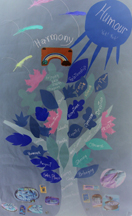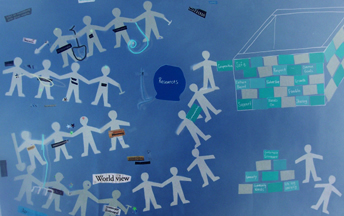The Learning Circles Project |
||
| The Hershare Group by Tracey Mollins |
||
Shelter from the Storm at Queen and Broadview in Downtown TorontoThe storefront is not prepossessing. If you were out on errands in the neighbourhood, you would probably never notice it. The door is kept locked and the centre is not open to the public. Once you are inside and your business stated, you are welcomed with coffee, snacks, and friendly greetings. The style here at Nellie’s is informal. The Hershare group had been meeting as a computer group when the facilitator left and Madeleine Mariano, the current facilitator came to Nellie’s. Mariano did not feel that she had the expertise to facilitate a computer group. She gathered the women together and spoke to them about alternatives. They decided to get together at the same time and share resources and information. The group is very relaxed and flexible. They decide collectively on topics for each meeting. Sometimes they invite community members or workers to come and share information and experiences with them. They have had workshops on health, surviving abuse, surviving tough times, dealing with eviction, employment readiness and living on Ontario Works (social assistance) and the Ontario Disability Services Plan. When I asked about how they make sure that the presentations and workshops are accessible to everybody regardless of education level or reading ability, they seemed surprised. They use video, print materials and discussion to share information. They feel that education level is not an issue; they are all on the same wavelength and different expertise and cultures are honoured. They spoke about how the attendance at meetings used to be much higher but they are busier now and cannot come as often. This is a positive development for the members as they find a place in their community, or re-find a place after being knocked off their path for a while. For some of the women, participating in the groups at Nellie’s is an opportunity to go out without their kids and spend time in the company of adults. Normally children do not come to the group but they make an exception if there is an important meeting where new information is to be shared and the mum needs to bring a child who is home sick. The group agrees on this exception. They do not spend much money but would love to have funding so that they could go on outings. Sometimes people offer them tickets to events but they cannot afford the transportation costs to get there. They wanted to go the market but they do not have money for lunch. The group evaluates how it is working informally by asking questions. They are planning a more formal evaluation process soon. The group has some rules: no abuse, no drugs or alcohol, and no violence. When there is conflict, Mariano or a group member facilitates a resolution process. If no resolution is possible and if the conflict is disruptive to the group, a member may be suspended for a period of time. This does not happen often. When I asked if they found that the things they had in common bound them in a way that would not let their differences drive them apart, they asked me what I thought they had in common. I said I wasn’t sure but it was an impression I was getting from listening to them talk about how they work together. They spoke about all the reasons why a person might come to Nellie’s. One person remarked, that what they have in common was that they are poor and needy. The women then spoke about how much they hated the word poor being used to describe them. We then got into a discussion about education and equity. These women have heard the message that they need to change themselves if they want economic stability; they need to get training and upgrade their skills. They know that one of the main barriers to economic stability is not their lack of training or skills, but their class and/or race. They spoke about how because their class, present economic situation, race, ethnic background, etc., many educational opportunities were either closed or barrier-ridden for them. They said that there needs to be more alternatives and more inclusive opportunities. They would like to see more online education. They would like to see more high level English as a second language education. To qualify for many programs, one must have a grade twelve but this can be very difficult to achieve. Most adult high schools or college upgrading courses are full time and students find it difficult to support themselves while at school; are held at times that make it costly or impossible for parents to attend; or have other prohibitive costs associated with it. For some, the requirements of Ontario Works has made it impossible for them to attend school. They feel that there should be other ways to qualify for college courses. They feel that adults who need high school diplomas and/or other upgrading should be eligible for financial aid. Some of the women who immigrated to Canada reported discrimination in classes. Despite the fact that they speak fluent English (one woman immigrated to Canada after many years in England), they are often directed to English as a Second Language classes rather than the computer classes or other classes they wanted to take. They feel that even if they insist on the courses they want, they are labeled before they even start. Some of the women have found that they have to take a lot of tests to qualify to take a course. They feel that these tests are designed to keep people out rather than set academic standards. They also have questions about whether the effort is worth it. They feel that in the workforce, success is less based on what you know than on who you know. The women report that they have been told that they must work for free, as a so-called apprentice, before they can be hired. Rarely does this type of apprenticeship lead to paid work. And of course, there are the stories of being excluded from work opportunities due to lack of Canadian experience. The women of Hershare are aware of which barriers to equitable participation are individual barriers and which are systemic. They take responsibility for the things they can change and are resourceful and tenacious in their quest to do so. This group works on the freedom zone model. They build, within the walls of this Queen Street storefront, the inclusive, non-judgmental, open, safe and free society they yearn for. They build strength, individually and collectively, so that they can face the reality of the society outside the locked door with increased resilience and courage. And after a rough day, week, or hour they can return for comfort, acceptance and rejuvenation |
||

